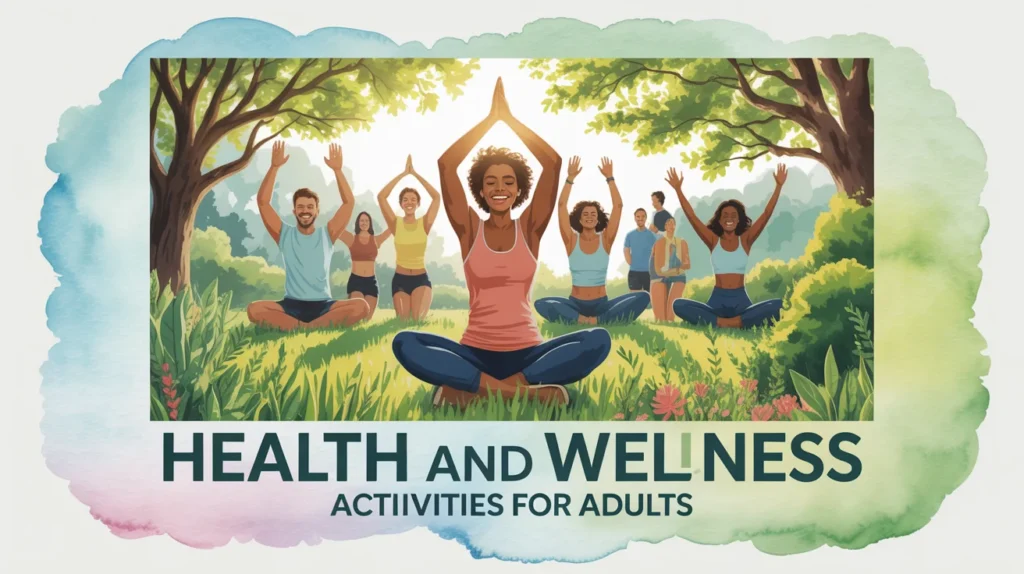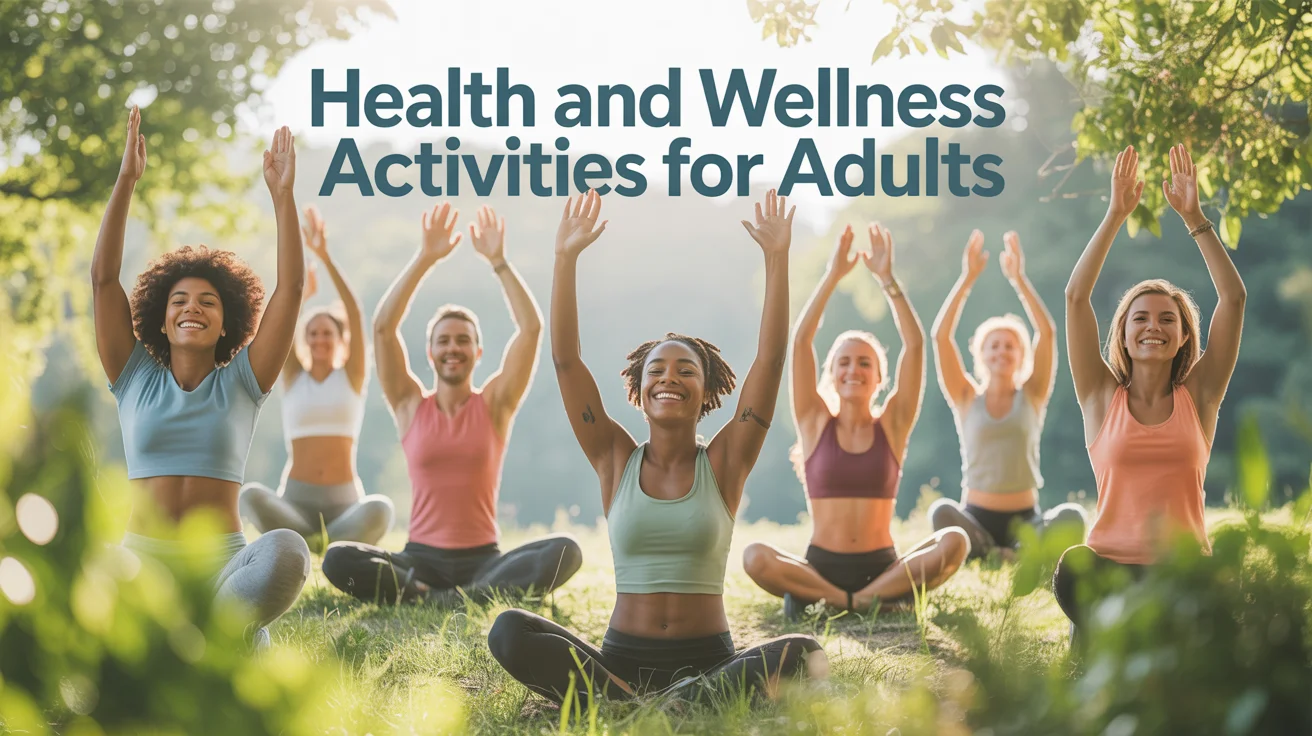Health and Wellness Activities for Adults: A Path to a Healthier Life
In today’s fast-paced and digitally overloaded world, health and wellness activities for adults have become more essential than ever. Staying healthy isn’t only about physical fitness; it also includes mental calm, emotional balance, and social connection.
With increasing work stress, digital fatigue, and lifestyle-related diseases, adults must actively invest in holistic wellness practices that support long-term health.
Whether you’re in your 30s, balancing career and family, or in your 50s looking to stay active and energetic, this guide offers practical, enjoyable, and proven wellness activities tailored to adult life.
Each suggestion is backed by behavioural science, mindfulness practices, or proven physical routines to ensure you don’t just survive, but thrive.
1. Functional Fitness and Movement: Stay Strong, Stay Independent
One of the most important aspects of adult wellness is maintaining physical independence. Functional fitness routines are designed to help adults perform everyday activities, such as walking, bending, lifting, and climbing stairs, with ease.
Regular movement builds muscle, reduces inflammation, and strengthens the heart. Even brief 20-minute sessions can improve energy levels and reduce the risk of chronic illnesses, such as diabetes and arthritis.
This type of activity includes exercises that support real-life movements and prevent falls or injuries, which is especially important for adults over 40.
2. Mindfulness Meditation: Reset Your Brain and Body
Many adults face constant pressure from work, family responsibilities, or health issues. This stress accumulates silently, triggering anxiety, sleep problems, and fatigue. Mindfulness meditation provides a powerful solution to these problems.
Practising mindfulness daily can reduce cortisol (the stress hormone), improve memory, and enhance emotional regulation. It can be as short as 5–10 minutes in the morning or before sleep.
This simple habit can rewire the brain to become more resilient, calm, and focused.
3. Creative Hobbies That Stimulate and Heal
Hobbies are not just for leisure, they’re for healing, focusing, and recharging. As adults face increasing mental clutter, creative hobbies offer much-needed clarity and a boost in dopamine.
You don’t need to be a professional artist or musician to enjoy these benefits. What matters is the process, not the outcome.
Wellness-Based Hobby Ideas:
- Adult colouring books for relaxation
- Playing a musical instrument to sharpen focus
- Journaling thoughts for emotional release
- Learning a new language for brain health
- DIY home decor or furniture restoration
4. Social Wellness Practices: Connect to Thrive
Humans are naturally social beings. As adults cross into their 30s, the demands of work and family often replace deep friendships. But social connections are crucial for emotional health and mental resilience.
People with strong social ties live longer and report lower levels of anxiety and depression. Even casual interactions or shared activities can make a lasting positive impact. Being part of a community boosts confidence and gives life meaning.
Simple ways to enhance social wellness include hosting potluck dinners, joining local fitness challenges, or taking creative group classes. Volunteering at nearby events also brings joy and a sense of purpose. Regularly checking in with friends or family strengthens emotional bonds.
5. Digital Detoxing: Reclaim Your Mental Space

Technology has improved our lives, but it has also taken over our time and attention. Adults who spend too much time on screens report higher levels of anxiety, poor sleep, and low productivity.
A digital detox is not about eliminating devices; it’s about reclaiming control. Reducing screen exposure allows your mind to reset, improves posture, and enhances personal connections.
Try a 24-hour no-social-media Sunday or switch to analogue tools like paper planners and physical books during evenings. These small changes free up mental energy and help build focus.
6. Nature-Based Wellness: Healing in the Outdoors
Nature has its kind of medicine. Just 20 minutes a day spent outdoors can lower heart rate, reduce blood pressure, and elevate mood. Adults who frequently interact with green spaces are less prone to depression and burnout.
You don’t have to travel to a forest. Even urban parks, home gardens, or morning walks by water bodies can offer these benefits.
Effective Nature-Based Wellness Habits:
- Daily morning walk in a park or on a trail
- Gardening, even on a balcony
- Grounding (walking barefoot on grass)
- Sunset watching without devices
- Weekend hikes or forest bathing
7. Nutrition Routines That Fuel and Protect
You can’t build wellness without the right fuel. Adult bodies need more protein, fibre, healthy fats, and water than ever before. Processed foods, sugar, and low hydration all reduce vitality, affect sleep, and increase disease risk.
Creating balanced nutrition habits doesn’t mean following extreme diets. It means thoughtful meal planning, clean eating, and intuitive nourishment.
Start with weekly grocery planning. Prioritize whole foods, seasonal fruits, and home-cooked meals over fast food. Keep snacks like almonds, fruits, and herbal teas instead of chips and soda.
8. Sleep Hygiene: The Underrated Wellness Pillar
Sleep is the foundation of adult wellness, yet it’s often ignored. Inadequate sleep increases the risk for heart disease, mental fog, and hormonal imbalances. An intense sleep routine isn’t just about how long you sleep, but how well.
Key Sleep Improvement Habits Include:
- Consistent sleep and wake-up time, even on weekends
- Avoiding caffeine or heavy meals after 6 PM
- Using lavender or white noise for deeper sleep
- No screen time 1 hour before bed
- Journaling worries before sleep to avoid racing thoughts
9. Emotional Regulation Techniques
Being an adult means managing complex emotions, grief, anger, anxiety, and self-doubt. Emotional wellness is about recognizing your feelings and responding wisely. When ignored, suppressed emotions can lead to burnout or even physical illness.
Developing emotional regulation techniques builds long-term resilience and stronger relationships.
Emotional Wellness Habits to Try:
- Daily mood tracking to identify emotional patterns
- Practicing forgiveness (for yourself and others)
- Learning assertive communication
- Replacing negative self-talk with positive affirmations
- Using apps for guided emotional check-ins
Final Thoughts: Build a Sustainable Wellness Routine
Health and wellness activities for adults aren’t meant to overwhelm; they’re intended to integrate into your lifestyle gently. Start with 1–2 habits a week, track your progress, and reward consistency.
Whether it’s a daily 10-minute stretch, replacing soda with herbal tea, or calling an old friend, every small act compounds into lasting change.
You don’t need perfection to be well. You just need action and intention.
Frequently Asked Questions:
1. What are the best daily health and wellness activities for adults?
The best daily activities include walking, drinking enough water, mindful breathing, stretching, and getting quality sleep. These small routines can significantly improve your physical and mental well-being.
2. How can I stay mentally healthy as an adult?
You can stay mentally healthy by practicing mindfulness, managing screen time, journaling, socializing regularly, and getting enough rest. These help reduce anxiety and boost focus.
3. Are there health and wellness activities for adults with busy schedules?
Yes, activities like 10-minute guided meditations, short walks, quick home workouts, or mindful eating can easily fit into tight schedules without sacrificing results.
4. Why is social wellness essential for adults?
Social wellness enhances emotional health, reduces feelings of loneliness, and boosts overall life satisfaction. Regular social interaction builds support systems and enhances mood stability.
5. Can hobbies improve my overall wellness?
Absolutely. Hobbies reduce stress, support emotional expression, and keep the brain active. Creative or relaxing hobbies, such as gardening, painting, or reading, are highly beneficial for adult wellness.


